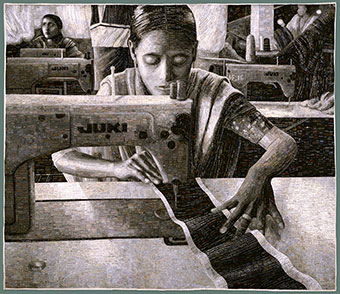The Swedish Minister of Justice Thomas Bodström can without a doubt be placed among the European Ministerâ??s most hostile to civil liberties (older posts about this here & here & here). Besides blogging about it (along with many others) Henrik Sandklef and I wrote a debate article concerning this mans naïve faith in technological solutions to crime. It was published in the newspaper (in Swedish) and the Minister replied â?? well sort ofâ?¦he never actually met our arguments on civil rights violations, but claimed that the police needed tools to do their job (in Swedish).
Yesterday the Chairman of the Swedish Police Union, Björn Ericson, wrote in a debate article (in Swedish) that despite the Ministerâ??s claims that the police force has increased by 1500 policemen the actual numbers show that the number of policemen have decreased by almost 700 since 1997. Ericson wonders whether the 1500 policemen are all working deep undercover since nobody besides the Minister seems to know where they are.
Besides the politics (it is, after all, an election year), Ericson brings up a vital point in his article. Who will watch the tapes, analyse the data and read the log files? Much of the current wisdom concerning police enforcement deals with the importance of visibility. Policemen on the streets. It is not only important that the police patrol but also that they be seen to be patrolling.
Technology costs. The cost of building and maintaining a high-tech police force will create higher costs for the police. This will mean that they will have to make budget choices. Either be visible or spend money on technology. Our Minister has shown his inclination lies in the dream of a technological future â?? but what is missing in this dream?
Implementing the high-tech surveillance society will entail making choices. Simple choices with far reaching effects. The Bodström vision entails moving the police from all types of prevention and focus them on the cure. In the long run prevention is more cost efficient than cure. All the high-tech in the world cannot, will not, prevent crime. The only aspect of use is that high-tech may provide proof in the ensuing court case. And this can only be achieved through the trampling of civil liberties and therefore must only be used as little as possible.
The choices the police are being forced to make will therefore change their purpose. They will not be about the prevention of crime but rather the police will become the servants of the courts, the errand boys of the prosecutor. Despite their handcuffs, handguns and truncheons their primary work will be the collection of data for analysis. This is not unworthy work but it does not prevent the bulk of most crimes.
Technology such as that of bugging (phones and computers), DNA databases and surveillance cameras are all tools. Tools work well to resolve certain problems. With the right tools people became efficient â?? a large part of human development can be studied in the development of certain tools (fire, bronze axes, steam engines, silicon chipsâ?¦) but with the wrong tools the work becomes difficult, if not impossible. Of course you can bang in a nail with a screwdriver â?? but at a cost.
Most violent crimes (Terrorism, Saturday-night brawling, violence and abuse at home) will not be prevented by buying technology. The 9/11 terrorists used their own names â?? it would not have mattered to them if they had been asked to donate DNA. Putting more, and better trained, police on the streets â?? does have an effect on crime.
More patrolling policemen would not have prevented 9/11 â?? there is no way to prevent the determined. More patrolling police will not prevent abuse in homes. This takes an even more costly prevention â?? education and social welfare. But it is a better preventative cure for most other crimes. In addition to this it does not violate the civil rights of law-abiding people in the hope of catching the criminal.
There is a saying: When the only tool you have is a hammer, every problem looks like a nail. Thomas Bodström is busying buying the dream of the big high-tech hammer and no matter how many different problems people attempt to explain to him with this approach all he can see is nails â?? and he cannot wait to pound us down.





